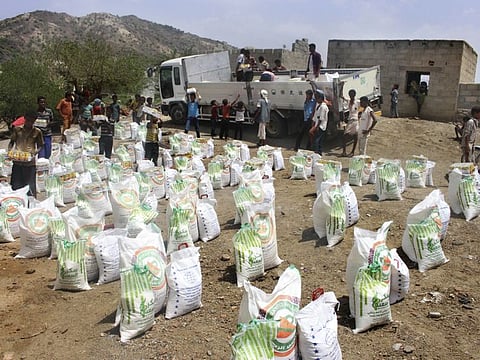UN: Al Houthi militia impeding aid flow in Yemen
Militia has made granting access to areas under its control contingent on conditions

New York: Yemen’s Al Houthi militia have blocked half of the United Nations’ aid delivery programmes in the war-torn country _ a strong-arm tactic to force the agency to give them greater control over the massive humanitarian campaign, along with a cut of billions of dollars in foreign assistance, according to aid officials and internal documents obtained by The Associated Press.
The militia has made granting access to areas under their control contingent on a flurry of conditions that aid agencies reject, in part because it would give the Al Houthis greater sway over who receives aid, documents and interviews show.
The Al Houthis’ obstruction has hindered several programs that feed the near-starving population and help those displaced by the nearly 6-year civil war, a senior UN official said, speaking on condition of anonymity to discuss the situation.
“Over 2 million beneficiaries ... are directly affected,” the official said.
The Al Houthis have been pushing back against UN efforts to tighten monitoring of some $370 million a year that its agencies already give to government institutions controlled mostly by the group, documents show. That money is supposed to pay salaries and other administration costs, but more than a third of the money spent last year wasn’t audited, according to an internal document leaked to the AP.
The UN has largely kept quiet in public about the pressure, but behind the scenes the agency and international donors are digging in against the Al Houthi demands. The AP spoke to seven workers and officials from UN and independent agencies about the situation. All spoke on condition of anonymity for fear of reprisals. The AP also saw dozens of documents, including emails of aid officials.
In October, the UN humanitarian coordinator for Yemen, Lise Grande, sent a letter to the Al Houthi-appointed “prime minister” complaining about a long list of demands.
The “overwhelming majority” of them impede or delay delivery of aid and many violate humanitarian principles, she said in the letter, a copy of which was obtained by the AP.
For months, the Al Houthis demanded a 2 per cent cut from the entire aid budget be given to them, a condition the UN and donors rejected. In an email to the AP, a spokesperson for the US Agency for International Development said Al Houthi attempts “to implement a tax on humanitarian assistance are unacceptable and directly contradict international humanitarian principles.” The United States donated $686 million to Yemen in 2019, according to USAID.
Last week, the Al Houthis appeared to back off the 2 per cent demand, but continue to press for other concessions, according to aid officials.
During a meeting in Brussels last Thursday, aid agencies and international donors threatened to reduce aid if Al Houthis continue to impose restrictions on UN operations in Yemen.
The situation “has reached a breaking point,” they said in a statement.
At least one agency, the World Food Program, is currently considering cutting back the monthly food aid it delivers to 12 million Yemenis every other month, a UN official said. “It’s unfortunate that people will suffer but this is on the Al Houthis,” the official said. “They can’t use people as hostages for too long.”
The Al Houthis’ demands have stoked longtime concerns among aid agencies over the militia’ diverting of humanitarian funds and supplies into their own or their supporters’ pockets or toward their war effort.
Delivering aid in a war zone has always posed a problem for UN agencies. But officials said the situation in Yemen has been especially challenging.
The Al Houthi have withheld visas and permissions for equipment and supplies and refused to grant clearances for UN missions to move through rebel-controlled areas. Aid workers said agency leaders’ past willingness to concede to some of the militia’ demands has emboldened the Al Houthi leaders to push for more.
Nearly 300,000 pregnant and nursing mothers and children under age 5 haven’t received nutrition supplements for more than six months because the Al Houthis “held beneficiaries hostage to the 2 per cent” demand, another UN official said.
In another example, Al Houthi authorities for months delayed permission to distribute 2,000 tons of food – enough to feed 160,000 people – in the district of Aslam, where the AP previously found starving villagers reduced to eating boiled leaves. When approval came in November, the food had spoiled “beyond the point of salvage,” another aid official said.
Al Houthi leaders have remained defiant in the face of UN pushback.
“Yemen will survive” if agencies suspend aid, Abdul-Mohsen Tawoos, secretary-general of the Al Houthi agency coordinating international aid, told European donors during aJan. 20 Skype call. Minutes of the call were obtained by the AP.
He said the Al Houthis wanted to reach an agreement with the UN and its donors, but “won’t be bullied.”
Tawoos accused Grande, the top UN official in Yemen, of sending false reports about Al Houthis restricting the movement of UN humanitarian operations. Al Houthi leaders have threatened to expel her from the country.
The UN’s massive aid programme, totaling $8.35 billion dollars since 2015, is vital to keeping many Yemenis alive. The UN calls the situation in Yemen the world’s worst humanitarian crisis.
Ten million people in the country are on the brink of famine and 80 per cent of the population of 29 million in need of aid, according to the UN.
Sign up for the Daily Briefing
Get the latest news and updates straight to your inbox



